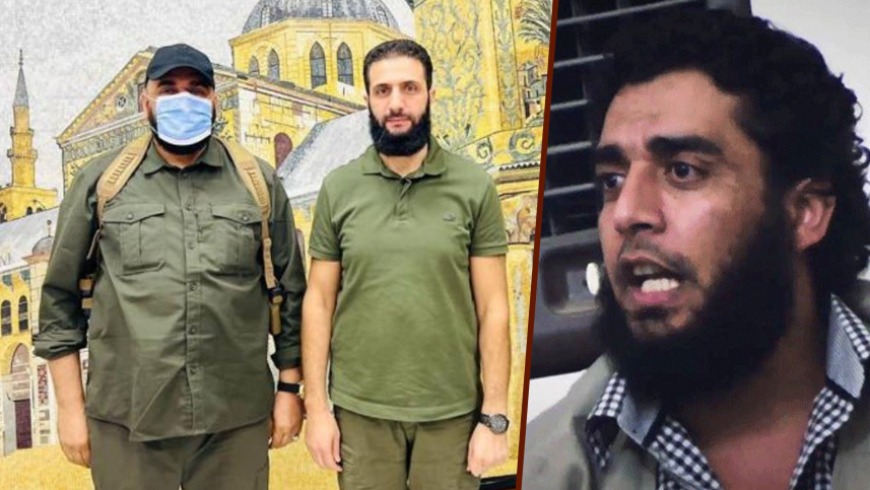Hay’at Tahrir al-Sham (HTS) finds itself enmeshed in a previously concealed internal conflict that has now erupted into the open, claiming its initial casualty, Abu Maria al-Qahtani, an Iraqi leader within the ranks of HTS.
Insiders well-versed in the intricacies of the disputes have confirmed to Syria TV that the security apparatus of HTS apprehended Qahtani last Monday. He faces charges of collaborating with the international coalition. The arrest followed the capture of a cell that reportedly confessed to being connected to him.
However, insiders reveal that the publicly announced charge isn’t the true catalyst behind HTS’s decision to detain Qahtani. Rather, it is rooted in concerns over his independent actions without coordination with the HTS leadership. This apprehension has triggered worries among influential figures like Deputy Commander-in-Chief Abu Ahmad Hudood and another significant leader known as al-Mughira al-Badawi, who happens to be Abu Muhammad al-Julani’s son-in-law.
Young Man Killed by Turkish Gendarmerie While Clossing Border Through Smuggling Routes
Sources indicate that Qahtani has been actively engaging with leaders within the Syrian National Army, former members of the Ahrar al-Sham movement, and various dissatisfied factions in opposition to the commission. His efforts aim to foster joint coordination and pave the way for a fresh beginning. Qahtani’s endeavours included reaching out to political activists who were critical of HTS, offering promises of reform.
However, powerful leaders who opposed these overtures managed to influence Julani. They convinced him that Qahtani’s actions were driven by personal interests and designed to consolidate his authority in northern Syria. These influential figures provided Julani with security intelligence indicating that Qahtani might be orchestrating a potential coup.
Following his arrest, a group of leaders, led by Judge Mazhar Weiss, engaged with the HTS in an effort to secure the release of Qahtani. HTS partially acquiesced, agreeing to place him under house arrest and restrict his movements. However, they stood firm on pursuing legal action against him for his alleged collaboration with the international coalition and his suspected involvement in planning to target HTS leadership. Additionally, various administrative and financial matters contribute to the ongoing tension.
Issue of contact with the International Coalition
Multiple reliable sources have informed Syria TV that the issue of Qahtani’s contact with the international coalition is indeed a matter of certainty. While there have been intermittent exchanges between the two parties over the past years, these interactions have notably escalated since the onset of this year. This intensification can be attributed to HTS’s mounting concerns regarding Turkey’s perceived efforts to undermine it in accordance with the Astana understandings.
It is important to note that the communication between Qahtani and the international coalition occurred with the knowledge and approval of HTS leadership. Contrary to suggestions of unilateral action without coordination, Qahtani’s engagement was a result of collective decision-making. Moreover, he extended an offer to the international coalition, with the explicit endorsement of Julani, to partake in any prospective operation originating from the Tanf base targeting Iranian militias. Additionally, Qahtani proposed involving what is commonly referred to as the eastern sector of the Commission in this potential operation.
Disputes and their impact on the influence of HTS outside Idleb
Anticipated repercussions of the ongoing conflicts within HTS are likely to cast a negative shadow on the organization’s efforts to extend its influence beyond the confines of Idlb. This specifically pertains to regions in northern Syria where the National Army holds a presence. Notably, individuals like Qahtani and another HTS leader, Jihad Issa al-Sheikh (also known as Abu Ahmed Zakour), have played integral roles in managing communications with factions within the National Army. Their objective has been to broaden HTS’ sphere of influence within these regions.
Sources that underpin Syria TV’s reporting have affirmed that the faction associated with Mughira Badawi and Abu Ahmed Hudood is also discomfited by the activities of Jihad Issa al-Sheikh. Concerns loom that he may be singled out for targeting by HTS leadership, potentially at the urging of his adversaries.
Should the discord escalate further and judicial actions be pursued against Qahtani, it is plausible that pressure tactics might be initiated against Sheikh Jihad Issa Sheikh. As the solitary figure wielding influence in territories occupied by the Syrian National Army, his tribal heritage and adept communication skills magnify his significance.
Past instances have witnessed segments within HTS engaging in communication with the Russian Hemeimeem base in Latakia’s outskirts. This resulted in leaked intelligence that subsequently prompted Russian airstrikes against sites affiliated with HTS. Broadly speaking, it’s evident that HTS remains susceptible to fluctuations in its public perception and susceptibility to challenges posed by rival factions.
This article was translated and edited by The Syrian Observer. The Syrian Observer has not verified the content of this story. Responsibility for the information and views set out in this article lies entirely with the author.


